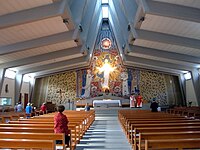Pope Pontian
Anterus | |
|---|---|
| Personal details | |
| Died | October 235 Sardinia, Roman Empire |
| Sainthood | |
| Feast day |
|
| Venerated in | Catholic Church, Eastern Orthodox Church |
Pope Pontian (
He
Pontian is venerated as a
Life
A little more is known of Pontian than his predecessors, apparently from a lost papal chronicle that was available to the compiler of the Liberian Catalogue of the bishops of Rome, written in the fourth century. The Liber Pontificalis states that he was a Roman citizen and that his father's name was Calpurnius. Early Church historian Eusebius wrote that his pontificate lasted six years.[2]
Pontian's pontificate was initially relatively peaceful under the reign of the tolerant Emperor Severus Alexander. He presided over the Roman synod which approved Origen's expulsion and deposition by Pope Demetrius I of Alexandria in 230 or 231.[1][2] According to Eusebius, the next emperor, Maximinus, overturned his predecessor's policy of tolerance towards Christianity.[3] Both Pope Pontian and the Antipope Hippolytus of Rome were arrested and exiled to labor in the mines of Sardinia,[4] generally regarded as a death sentence.[5]
In light of his sentence, Pontian resigned, the first pope to do so, so as to allow an orderly transition in the Church of Rome, on 28 September 235. This date was recorded in the Liberian Catalogue and is notable for being the first full date of a papal reign given by contemporaries. This action ended a schism that had existed in the Church for eighteen years. Pontian was beaten to death with sticks.[2][4] He died in October 235. Like Pontian, Hippolytus did not survive his exile. The two may have reconciled with one another in Rome or in Sardinia before their deaths.[6]
Veneration
In the Eastern Orthodox Church and the
San Ponziano, a titular church in Rome, is named in his honour. Churches named for Pontian are also found in Spoleto, Lucca and Carbonia, Sardinia.[11]
Gallery
-
The Martyrdom of Saint Pontianus (Baltasar de Echave, c. 1612)
-
Interior of San Ponziano, Rome
See also
- List of Catholic saints
- List of popes
- Pope Saint Pontian, patron saint archive
References
- ^ a b c d Kirsch, Johann Peter (1911). "Pope St. Pontian" in The Catholic Encyclopedia. Vol. 12. New York: Robert Appleton Company.
- ^ ISBN 978-0-19-213964-1.
- ISBN 978-0809147519.
- ^ ISBN 978-971-91595-4-4.
- ^ G. W. Clarke, "Some Victims of the Persecution of Maximinus Thrax," Historia: Zeitschrift für Alte Geschichte, Bd. 15, H. 4 (November 1966): pp. 445–453.
- ^ Richard P. McBrien, Lives of the Popes (San Francisco: Harper Collins, 2000), 45.
- ^ McBrien, Lives of the Popes, 45.
- ^ "Latin Saints of the Orthodox Patriarchate of Rome".
- ^ Calendarium Romanum (Libreria Editrice Vaticana 1969), p. 146
- ^ Catholic Encyclopedia.
- ISBN 978-8854109315– via Google Books.
Sources
- Herbermann, Charles, ed. (1913). . Catholic Encyclopedia. New York: Robert Appleton Company.
External links
 Media related to Pope Pontian at Wikimedia Commons
Media related to Pope Pontian at Wikimedia Commons


